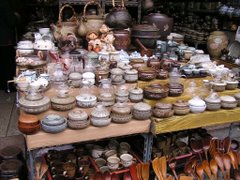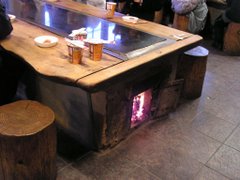My supervisor was one of the speakers in the 3rd Annual Conference The Philippine Association for Business Educators, (PAFBE) Inc held last July 30 and 31. Unfortunately, he had a sudden important engagement and I agreed to pitch for him. Dr. Lorenzo of PUP, the convenors, the officers, the teachers and delegates of PAFBE gave a warm response to my presentation.
Here are the excerpts of my presentation---
"Even with late notice, I tried my best to prepare something that you will bring home as part of a solution instead of posting many issues and concerns that may drag your weekend of pondering whether there is an answer to the never ending question of how do we implement technology.
For this afternoon, I am bringing to you a not very young idea. This is an idea typically used in business organizations in the light of sustaining the use and application of technology. And I will put this in the context of education. The title of my presentation is Creating Communities of Practice (COPs) through Practical ICT and Web 2.0."
"Context is putting and using technology on the right perspective of the subject matter. And the knowledge and skills of the business educators or even the teachers will be very important in this situation. Context is not using technology as suggested in the software tutorial. Context is making the students realize to use or apply the right technology as prescribed by the situation, the problem to be solved or the project to be done. And this is one of the creative challenges among teachers".
I hope I was able to inspire them of the idea of Communities of Practice. I have shared with them the concept, the characteristics as posted by Etienne Wenger, the proponent of the COP and I gave my own examples situating it to the local setting. I also hope that introducing Web 2.0 gave informative insights of various alternatives on how to use them in teaching. Some of these are--
Web 2.0 Teaching & Learning Tools
These are some of the common examples. There are still many tools and solutions.
Youtube – to showcase student experiences; to reuse good howto videos
An anthropological introduction to Youtube by Michael Wesch -- http://www.grokdotcom.com/2008/08/04/1462/
An ethical behavior and social responsibility video by Louie Sioco, James Sy & Johann Go http://www.youtube.com/watch?v=-EJW89mUagA
Blogs – to extend class discussions; to extend student interactions
http://whymanagetech.blogspot.com/2007/05/notes-on-external-business-environment.html
Forums, e-groups & social network sites – to post announcements; to share files; & to encourage healthy dialogues and responsible online behavior among students
Google maps – to visually enhance geography concepts
Online News – to know what is happening in the world
Wikis – to encourage collaborative writing and research
Photos – to encourage artistic expression and develop digital art skills
http://mobilemartha.multiply.com/photos/album/12/EM-TECH_Technology_Exhibit
Skype & yahoo messenger – to facilitate online discussions
Second life – to enhance remote role-playing activities
I also mentioned to them that mobile phones and music players are useful ICT tools--
o To capture proof of data gathering (e.g. interview)
o To capture procedures of the experiments
o To capture board notes
o To listen about the lessons or to produce outputs through podcasts
Podcasts are audio files in MP3 format that is used to hold various content like discussions, interviews, opinions or meetings.
Of course, PRACTICE makes PERFECT or EFFECTIVE OUTCOMES.
Very important hindsights to bring home---
1. Don’t get immersed in the technology, context is more important!
2. Make it a rule of thumb to apply your teaching techniques and styles.
3. Discuss your methods openly to your colleagues. It encourages “shared practice”.
4. Encourage student participation and collaboration.
5. Institutionalize “best practices” and build a “Community of Practice”!
Subscribe to:
Post Comments (Atom)








No comments:
Post a Comment